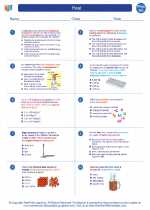Immune System
The immune system is a complex network of cells, tissues, and organs that work together to defend the body against harmful pathogens such as viruses, bacteria, and parasites. It is essential for protecting the body from diseases and infections.
Key Components of the Immune System
- White Blood Cells (Leukocytes): These cells are the primary defenders of the immune system. There are several types of white blood cells, including neutrophils, lymphocytes, monocytes, eosinophils, and basophils.
- Antibodies: These are proteins produced by the immune system to identify and neutralize foreign substances such as bacteria and viruses.
- Lymphatic System: This system includes lymph nodes, spleen, thymus, and lymphatic vessels, which help in the production and circulation of lymphocytes and antibodies.
- Bone Marrow: This is where blood cells, including white blood cells, are produced.
- Thymus: This organ is responsible for the maturation of T-lymphocytes, a type of white blood cell involved in cell-mediated immunity.
Types of Immunity
There are two main types of immunity:
- Innate Immunity: This is the body's natural defense system that provides immediate protection against pathogens. It includes physical barriers (skin, mucous membranes) and immune cells such as macrophages and natural killer cells.
- Adaptive Immunity: This type of immunity develops over time as the body is exposed to pathogens. It involves the production of specific antibodies and memory cells that provide long-term protection.
Immune Response
When the immune system detects a foreign invader, it initiates an immune response, which involves several steps:
- Recognition: Immune cells recognize and identify the pathogen as non-self.
- Activation: Immune cells become activated and initiate a response to eliminate the pathogen.
- Effector Phase: Immune cells and antibodies work together to destroy the pathogen.
- Memory: Some immune cells develop memory, providing long-term protection against future encounters with the same pathogen.
Disorders of the Immune System
Disorders of the immune system can lead to various health issues, including autoimmune diseases (where the immune system mistakenly attacks the body's own cells), immunodeficiency disorders (weakened immune system), and hypersensitivity reactions (allergies).
Study Tips
- Understand the different types of immune cells and their functions.
- Review the process of immune response and the role of antibodies.
- Learn about the organs and tissues involved in the immune system, such as the lymph nodes, spleen, and thymus.
- Explore the types of immunity and their mechanisms.
- Understand the implications of immune system disorders and their impact on health.
[Immune System] Related Worksheets and Study Guides:
.◂Physics Worksheets and Study Guides High School. Heat
The resources above cover the following skills:
PHYSICAL SCIENCE (NGSS)
Energy
Students who demonstrate understanding can:
Create a computational model to calculate the change in the energy of one component in a system when the change in energy of the other component(s) and energy flows in and out of the system are known.
Develop and use models to illustrate that energy at the macroscopic scale can be accounted for as either motions of particles or energy stored in fields.



